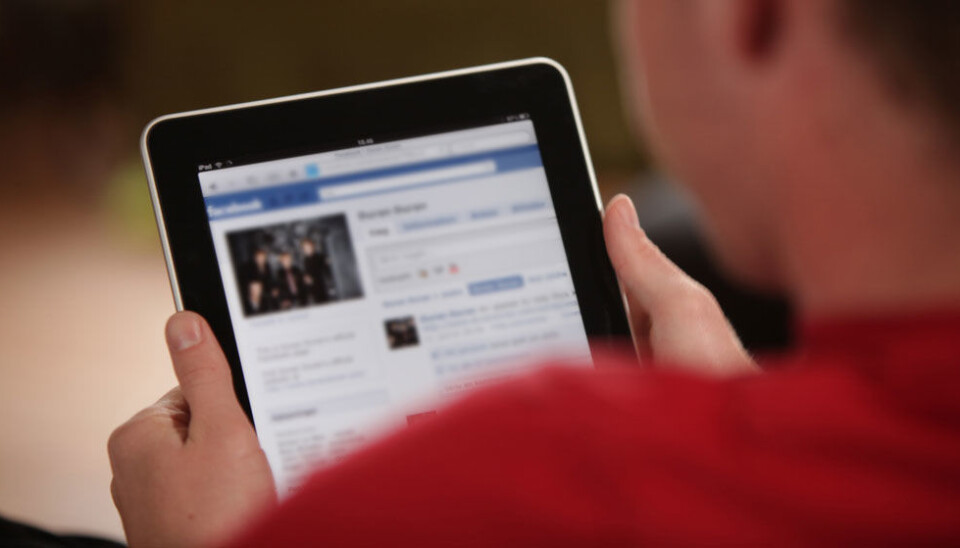
Our right to privacy shouldn’t be marketable
We might be irritated by the surveillance cameras in the local supermarket but tolerate the way our phones track our every move. Maintaining the right of privacy cannot be relegated to the individual or turned into a personal responsibility, according to Swedish researchers.
How much can you find out about the friend of a friend’s friend via Facebook?
Unless all the people in your circle of friends and acquaintances are meticulous about privacy settings, the chances are good you can find out quite a lot. Age, marital status, residence, shopping habits, political preferences – the sky is the limit for the information we put out on the Web, often without giving it any thought.
Most of us are less concerned about the potential surveillance information and conduits to which we ourselves contribute than about the closed circuit televisions (CCTVs) that have become so ubiquitous, even in the local convenience store.
André Jansson and Miyase Christensen of Karlstads University and the Royal Institute of Technology in Sweden have recently completed a research project on the ways that people relate to limitations on their private life and surveillance via new media.

They recommend what Christensen calls a neoliberal relationship to the protection of privacy.
“Public institutions and corporations such as Facebook and Google have no right to violate our civil rights, even though we have bought their services,” she says.
Younger, leftist women most concerned
The researchers asked a range of Swedes from different walks of life and regions to answer a questionnaire, and conducted in-depth follow-up interviews with 40 of the respondents.
Residents of small towns, immigrants in the Stockholm area and urbane and globally mobile young people from central Stockholm were given a chance to say what kind of surveillance they were concerned about– or not.
Some were more worried than others about the potential monitoring of their private problems, the study showed.
Older people were more concerned about this than younger people, women more so than men, and leftist-leaning individuals more than people on the political right.
Christensen said we are also more suspicious of external technologies than internal ones. External and internal are words that indicate whether the technology has become a natural part of our lives or not.
“We keep our mobile phones close to our bodies. That reduces the chances of us perceiving them as surveillance tools. We tend to view them as internal technological devices that do not monitor us. Surveillance cameras, on the other hand, are external. It’s easier to see them as spying from high up at us down here,” he says,
“Of course mobile phones actually represent a much more sophisticated way of spying on an individual, but many users don’t see it that way.”
Sacrifice web security on the altar of expedience
Most of us don’t even pretend to skim through the fine print in user contracts before we click on the “Accept” button for access to Google, Facebook, Amazon, Reddit or any other website or service. The text is long, tedious, legally complicated and after all, “everybody else is doing it.”
We sacrifice our web security and privacy on the altar of expedience.
“A common stance is that as long as I’m not doing anything wrong, I have nothing to worry about. If I started to worry, I would have to stop using these services, and that’s impossible,” says Christensen.
Dictatorial governments make use of that attitude when they justify encroaching on their citizens' privacy.
Christensen says that even though everyone uses these services, there is no safety in numbers, and no guarantee that our privacy is protected.
“It depends on how far your information input goes. It can be there forever, and you won’t know where your private information will end up. Even if you close your account, your information is still in storage ,” says Christensen.
Buying is agreeing?
She thinks it’s important for us to remember there is a difference between citizen and consumer. We are both, of course, but the logic of consumerism should not encroach on our civil liberties.
“The neo-liberal argument is that corporations are within their rights because the consumer has conceded to the arrangement by buying or using their services,” says the researcher.
“We definitely shouldn’t go down that road. We have civil rights that extend beyond the things we buy. This is where consumer groups enter the fray.”
Civil rights groups can study the contract regulations that the individual user cannot or will not bother to decipher, and can alert us if the conditions infringe on our rights or give a business too much sway with regard to our personal data.
A natural example of this kind of group is the Norwegian Data Protection Agency, even though it is a government body, under the wings of the Ministry of Government Administration, Reform and Church Affairs.
Not just an individual responsibility
Christensen mentions Facebook Beacon as an example of a people's victory. Beacon was a service launched in 2007, which instantly linked your account to your purchasing history on Amazon. The idea was supposed to be that this facilitated our sharing of reading experiences.
But what if you read a guidebook on how to get through a divorce you still hadn’t told your husband you wanted? Or read a self-help book for gays who wanted to, but didn’t dare, come out of the closet?
The result was a great deal of public pressure, and groups were founded to fight Beacon. Facebook finally shut down the whole service.
Christensen stresses that if you personally have no problem putting your entire life out there for perusal in cyberspace, you are free to do so. She doesn’t want to act as a moralist. She has a broader perspective, with a focus on society, politics and economics.
“This is a social negotiation process and we, civil rights groups, businesses and the state are responsible for upholding civil rights,” says Christensen.
-----------------------------------
Read the Norwegian version of this article at forskning.no
Translated by: Glenn Ostling









